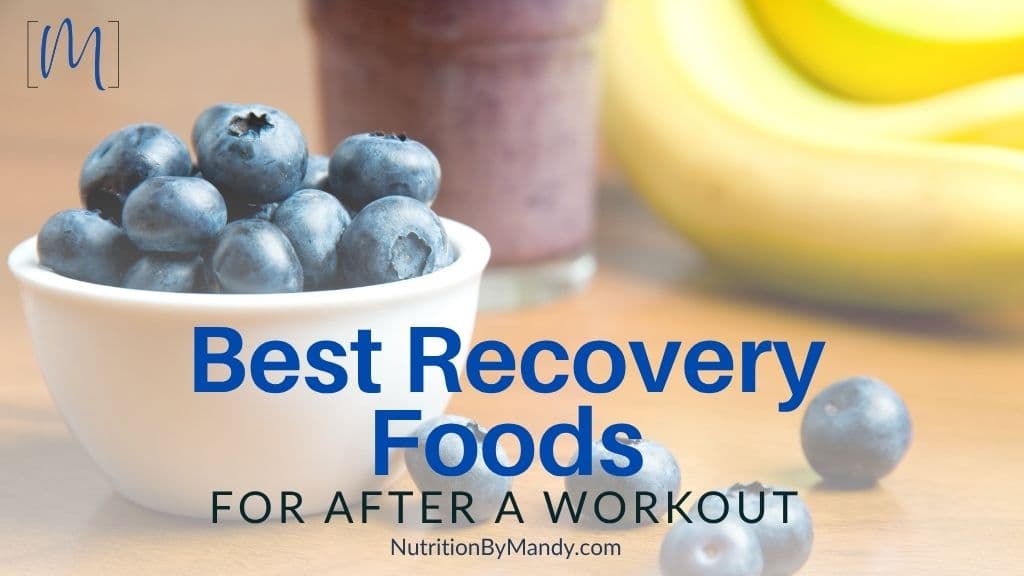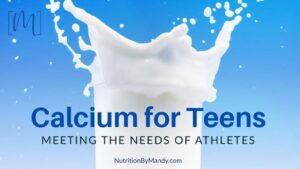Last Updated on November 9, 2025 by Mandy Tyler, M.Ed., RD, CSSD, LD
10 Best Recovery Foods After a Workout
Are you curious about the best recovery foods to eat after a workout to support your nutrition needs?
Let’s explore the recovery nutrition needs of athletes. Then I will share 10 of my top post-workout food choices to help athletes refuel and recover.
Recovery Nutrition Needs of Athletes
When considering the best foods to eat after a workout it is important to keep the recovery nutrition needs of athletes in mind.
The three key areas athletes should focus on in regard to recovery nutrition include:
- Rehydrate: Replace fluid and electrolytes lost in sweat
- Refuel: Replace carbohydrates used for energy during the session
- Build and Repair: Consume protein to build and repair muscles
In addition, I encourage athletes to enjoy foods post-workout that can help reduce inflammation in the body and support their recovery.
10 Best Recovery Foods After a Workout
The foods and drinks discussed below will support athletes with meeting their needs in one or more of these key areas of recovery nutrition.
I encourage athletes to combine these foods into well-balanced snacks and meals to enjoy following their workouts.
#1 Blueberries: Antioxidant-Rich Recovery Food
Blueberries are a great fruit option for athletes to enjoy following a workout. They have a high-water content and are packed full of nutrients, including: Vitamins A, C, and K, potassium, magnesium, and phosphorus (1, 2).
Blueberries are known for their high antioxidant content, which are associated with numerous health benefits (3). In particular, the phenolic compounds in blueberries have been associated with reducing oxidative stress as well as inflammation in the body (2, 4).
Pro Tip: Post-workouts athletes can enjoy blueberries in a Greek parfait or as an as ingredient in a healthy fruit smoothie.

#2 Bananas: High-Carb Fruit for Recovery
Bananas are a nutritious, high-carb fruit that athletes can enjoy with meals and snacks following a workout to support their recovery.
One large banana provides ~31 grams of carbohydrates as well as a variety of vitamins and minerals (5). Bananas also contain antioxidants and phytochemicals, which have anti-inflammatory effects in the body (6).
Bananas contain the electrolyte potassium. Potassium is necessary for muscle contraction, nerve transmission, normal cell function, and helping to maintain fluid balance in the body (7).
Athletes lose small amounts of potassium in sweat. Thus, consuming potassium-containing foods post-exercise can help replace sweat electrolyte losses and support rehydration after a workout (8).
Pro Tip: When athletes have limited time after a workout, they can grab a banana and chocolate milk to enjoy as a snack until they have time to eat a full meal. Athletes can also add sliced banana to a peanut butter sandwich for a tasty recovery food option.
#3 Salmon: Protein-Rich, Anti-Inflammatory Recovery Food
Following a workout, salmon is a nutritious option to support athletes with meeting their protein needs. A 3-oz serving of cooked salmon provides ~21 grams of protein (9). Thus, eating just 4-5 ounces of salmon will support most athletes with meeting their post-workout protein needs.
In addition to protein, salmon contains healthy omega-3 fatty acids. Omega-3 fatty acids have many important roles in the body, including helping to reduce inflammation (10).
Thus, due to both it’s protein and omega-3 content, salmon is one of my top recovery food choices for athletes.
Pro Tip: Salmon burgers can be a convenient option for athletes following a workout. Frozen salmon patties can quickly be prepared in the air fryer and make a tasty addition to an athlete’s dinner.
#4 Eggs
Eggs are another nutrient-rich recovery food to help athletes meet their protein needs following a workout.
A large egg contains ~6 grams of complete protein. The majority of the protein in the egg comes from the egg white (4 grams), however, the yolk is rich in vitamins and minerals (11, 12).
In addition to protein, eggs contain choline, a nutrient that is important for cognitive function. Eggs also contain selenium, riboflavin, Vitamin K, and antioxidants (13).
If athletes need a quick post-workout snack on-the-go, hard-boiled eggs paired with grapes and graham crackers can be a great choice.
Pro Tip: To help save time during the week, athletes can meal prep hard-boiled eggs in advance. Athletes can also purchase hard-boiled eggs at the grocery store that come peeled and ready to eat.

#5 Greek Yogurt: High-Protein Recovery Food
Greek yogurt is a great way for athletes to add protein to their post-workout snack or meal. A 1-cup serving of Greek yogurt provides ~25 grams of protein (14).
Individual containers of Greek yogurt are a convenient snack option for athletes to pack in their bag to enjoy following a workout.
One of my personal favorite post-workout snack options is a Greek yogurt parfait topped with berries and protein granola.
Pro Tip: Greek yogurt can also be used to boost the protein content of a fruit smoothie. It is a convenient way to add protein to an athlete’s favorite smoothie recipe without the use of a protein powder.
#6 Chocolate Milk: Post-Workout Drink
Chocolate milk is one of my favorite recovery drink options for athletes. Not only is chocolate milk tasty, it provides fluid, carbohydrates, and protein – supporting athletes with meeting their recovery nutrition needs.
Let’s look at the nutrition content of chocolate milk (15):
- Fluid: Chocolate milk is 90% water and a natural source of electrolytes
- Carbohydrates: 1-cup of chocolate milk provides 26 grams of carbohydrates
- Protein: 1-cup of chocolate milk provides 8 grams of high-quality complete protein
Pro Tip: Along with chocolate milk, athletes can enjoy a banana, some granola bars, or a peanut butter and jelly sandwich to further boost their carbohydrate intake after a workout.
#7 Tart Cherries and Tart Cherry Juice
Tart cherries are a nutrient-rich recovery fruit choice for athletes following a workout. They contain Vitamin C, potassium, calcium, magnesium, and iron (16). In addition, tart cherries contain antioxidants and phytochemicals, which have anti-inflammatory effects in the body (17).
Due to the high antioxidant content of tart cherries, consumption of tart cherry juice has been researched as a way to help reduce muscle soreness and decrease inflammation following exercise (17).
Tart cherries also provide a natural, dietary source of melatonin (18). Thus, following an evening workout, I frequently recommend tart cherry juice as a natural way to support sleep for athletes (19).
Pro Tip: Athletes can enjoy a glass of tart cherry juice post-workout, include tart-cherries in their post-workout snack, or add tart cherry juice to an anti-inflammatory post-workout smoothie.

#8 Sweet Potato: Nutrient-Rich Vegetable for Recovery
A sweet potato is a nutrient-rich vegetable option for athletes to enjoy with their post-workout meal. Sweet potatoes provide carbohydrates and fiber, as well as vitamins, mineral, and antioxidants (20).
Sweet potatoes also contain the antioxidant, beta-carotene, which is used by the body to produce Vitamin A (21). Having adequate amounts of Vitamin A in the body supports a healthy immune system as well as muscle recovery post-exercise (22).
Pro Tip: For a sweet and savory post-game meal, consider enjoying a baked potato topped with chili and beans. This is a tasty way for athletes to support their recovery nutrition needs, providing both carbohydrates and protein.
#9 Quinoa
Quinoa is a nutrient-dense recovery food to include in an athlete’s post-workout meal. It has the benefit of providing both carbohydrates as well as protein.
A 1-cup serving of cooked quinoa provides 39 grams of carbohydrates and 8 grams of protein. In addition, quinoa contains dietary fiber, B vitamins, iron, zinc, and magnesium (23).
Unlike most grains, quinoa is a complete protein, containing all 9 of the essential amino acids. Thus, for athletes following a vegetarian or vegan diet, quinoa can be an excellent way to boost the protein content of their post-workout meal.
Quinoa is also naturally gluten-free (24). Thus, it can be a nutritious way for athletes following a gluten-free diet to add both carbohydrates and protein to their meals.
Pro Tip: Consider enjoying a grain bowl with quinoa, salmon, leafy greens, roasted vegetables, chopped walnuts, and hummus for a nutrient-packed post-workout meal.
#10 Nuts and Nut Butter
Finally, nuts and nut butter are a nutritious recovery food for athletes, containing healthy unsaturated fats, protein, vitamins, and minerals.
In addition, nuts provide a good source of phenolic compounds, which have antioxidant and anti-inflammatory effects in the body (25).
Different types of nuts provide different phenolic compounds and nutritional benefits. Thus, athletes should include a variety in their overall sports nutrition meal plan.

Adding Nuts and Nut Butter to Post-Workout Meals and Snacks
Ideas for adding nuts and nut butters to an athlete’s post-workout meals and snacks include:
- Stir chopped walnuts into protein overnight oats
- Top a Greek yogurt parfait with sliced almonds
- Enjoy a classic peanut butter and jelly sandwich
- Prepare a hearty trail mix with nuts, seeds, dried fruit, pretzels, and breakfast cereal
- Top a protein toaster waffle with almond butter and sliced banana
- Blend peanut butter into a high-calorie smoothie post-workout
Pro Tip: An added benefit of nuts and nut butter is that they do not require refrigeration. Thus, they are an ideal travel snack for athletes to enjoy following away games.
10 Best Recovery Foods After a Workout
You are now set with ideas for 10 recovery foods for athletes to enjoy following a workout or competition. Athletes should make sure to plan ahead to have the right foods available post-workout to support their recovery nutrition needs.
For additional sports nutrition tips for athletes, make sure to check out my blog with pre-workout breakfast ideas.
Join the Nutrition By Mandy Email List & Get a Free Weekly Meal Planner Template
Click HERE to join the Nutrition By Mandy e-mail list. When you join you will receive a free weekly meal planner template to download and plan out your meals for the week.
About the Author
Mandy Tyler is a Sports Dietitian Nutritionist in the San Antonio, TX area. She is a Registered and Licensed Dietitian, a Board-Certified Specialist in Sports Dietetics, a Licensed Athletic Trainer, and is a Certified Exercise Physiologist through the American College of Sports Medicine. Mandy has experience working with athletes at the high school, collegiate, and professional levels. She believes the key to reaching one’s full potential, both in everyday life and in sports performance, relies on a healthy nutritional foundation.

If you are looking to take your performance to the next level, make sure to check out my new Sports Nutrition Game Day Guide. This downloadable guide is written to help athletes develop an individualized plan to achieve peak performance on game day.





